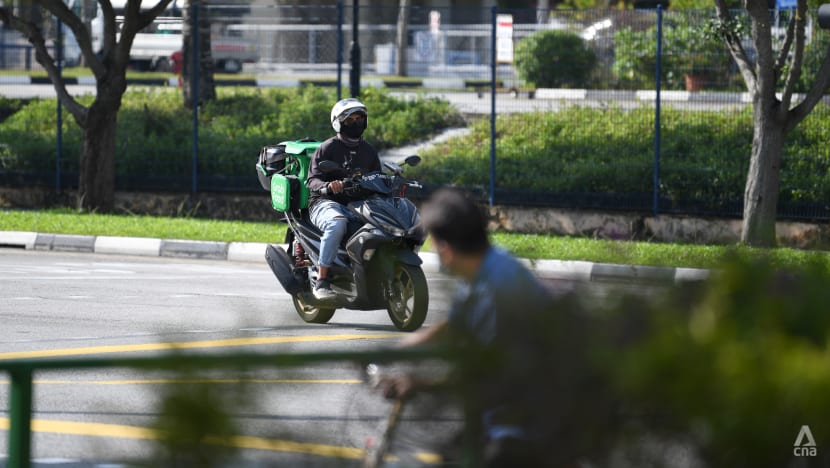Platform workers should not rely on Medishield Life for work injuries as insurance body suggested: Koh Poh Koon
Dr Koh Poh Koon also said that the General Insurance Association of Singapore's insurance coverage suggestions for platform workers would raise business costs for companies.

A food delivery rider in Singapore. (File photo: CNA/Calvin Oh)
SINGAPORE: The General Insurance Association of Singapore's (GIA) proposal to cover platform workers under Medishield Life for medical expenses is essentially asking them to pay for their own medical expenses, Senior Minister of State for Manpower Koh Poh Koon said on Tuesday (Nov 29).
In principle, platform workers should receive the same level of coverage for work injury compensation as employees, who are currently covered for up to S$45,000 in medical expenses for work injuries by employers, he added.
"There is no reason why platform workers should have to rely on Medishield Life which they pay for using their own MediSave and consequently pay part of the medical bills using their MediSave or out of pocket cash if they suffer a work injury," said Dr Koh.
Essentially, platform workers would be paying for their own medical expenses under such a suggestion, he added.
Dr Koh was responding to a question in Parliament about injuries among platform workers, such as private hire drivers and food delivery riders. MP Tan Wu Meng (PAP-Jurong) subsequently referred to the GIA's proposal and asked why insurers and platform companies did not make the suggestion earlier given that they "knew that there are riders who are dying on the job".
Last Wednesday, the Advisory Committee on Platform Workers made 12 recommendations on the better protection of such workers, including through Central Provident Fund contributions and enhanced injury compensation.
One of them is a requirement that platform companies provide the same scope and level of work injury compensation as employees are entitled to under the Work Injury Compensation Act (WICA). The committee made this suggestion noting that insurance coverage was uneven for workers across the different platforms.
The government accepted the recommendations, which will be implemented gradually from the later part of 2024 at the earliest.
In response to the recommendations, the GIA suggested protections outside the Work Injury Compensation framework, as it has its downsides.
"An employee on a fixed wage may find it easy to quantify his income, but a platform worker must quantify and prove his loss of income over many months, and for many of them, across multiple platforms," GIA's chief executive Ho Kai Weng said in a statement last Wednesday.
Apart from MediShield Life, Mr Ho proposed adapting Prolonged Medical Leave (PML) insurance for longer term income replacement beyond 60 days. Platforms have bought these for their taxi and private hire drivers since 2019.
The GIA also suggested covering permanent incapacity and death with group personal accident or term life insurance, which covers platform workers 24 hours a day. Under this, platform workers would not have to prove that they were working at the time of the accident.
Dr Koh said in Parliament that GIA's suggestions would lead to higher insurance premiums and business costs for platform companies.
He said that providing the same level and scope of work injury compensation under WICA would be fair to platform companies and their workers.
"It is fair to platform workers because they receive the same work injury compensation protection as other workers exposed to the same job risks, such as employees in related sectors like logistics.
"It is fair to platform companies because they only need to cover platform workers if they are injured in the course of work."
The Government should not require platform companies to provide coverage for injuries that are not as a result of work, said Dr Koh.
It was also not right to provide a fixed pay-out to platform workers given that they are a diverse group with a range of earnings as some work infrequently while others work on a full-time basis, he said.
"The GIA's suggestion of using only existing prolonged medical leave insurance or group personal accident insurance in place of WICA would relegate this to a private insurance policy whose terms and conditions are dictated by the insurer without a clear mechanism to adjudicate disputes," he added.
Offering prolonged medical leave insurance and group personal accident insurance at the same level of coverage as WICA would result in higher insurance premiums for platform companies compared to an insurance policy based on the advisory committee's approach, said Dr Koh.
"I appreciate why insurers would want more flexibility in how they compensate claims. But to ensure fairness to workers and companies, I do not think we should be leaving it to insurers to be the final arbiter of any disputes in work injury claims."
Noting GIA's confidence in its existing products and policies, Dr Koh suggested that GIA members work closely with platform companies to offer financial protection and compensation for these workers at the level of WICA "as soon as possible by the first quarter of next year", while maintaining the cost of premiums with WICA insurance products.
"This will provide better coverage for the workers in the interim and keep costs manageable for platform companies and consumers while we work on the implementation details of WICA for this group of workers by the end of 2024."











_1.jpg?itok=Pt4lopXb)




